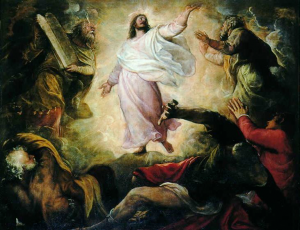HOMILY LENT SUNDAY 2 A
The Transfiguration – To Glory Through the Cross
(Genesis 12:1-4; Psalm 33; 2 Timothy 1:8b-10; Matthew 17:1-9)
***********************************************************
The Glory of God is man and woman fully alive!
That statement by St. Irenaeus, and today’s liturgy, invite us to follow Jesus through the Cross to Glory and Transformation
Our modern society is almost obsessed with the avoidance of pain. There is a very high use of drugs to avoid pain. Much medical knowledge is diverted from healing illness to trying to satisfy the frantic effort by so many to stay young and avoid pain. John Bradshaw defines addiction as an attempt to avoid legitimate suffering, although one participant in a 12 Step workshop pointed out that addiction is also a major form of suffering in its own right. The saying, “We are not punished for our addictions, but by them” comes to mind, and there is certainly some truth in that.
The faith reality is that God does not give us a ladder to escape pain, but a drill to enter into it and use it to grow. Those who are in therapy will sometimes hear the saying “the only way through the pain is through the pain.” There are some things, some lessons in life that we can learn only through suffering. Faith enables us to turn our suffering into redemptive suffering, suffering that has meaning.
 The gospel account today of the transfiguration, is all about helping the apostles to face the coming passion of Jesus by removing the scandal of the cross. It can also help us today cope with suffering in our lives. The context of the story is both Peter’s profession of faith in Jesus as the Messiah or Anointed One, and the first prediction of the Passion.
The gospel account today of the transfiguration, is all about helping the apostles to face the coming passion of Jesus by removing the scandal of the cross. It can also help us today cope with suffering in our lives. The context of the story is both Peter’s profession of faith in Jesus as the Messiah or Anointed One, and the first prediction of the Passion.
It is a gospel of many elements rich in symbolism and meaning. The six days after the first prediction of the passion that begins chapter 17 represents a new creation. The three apostles who accompany Jesus are significant: Peter is the first pope; James the leader of the Jerusalem church, and John the last apostle to die – our last link with the apostolic church.
Moses and Elijah are paired because they were both prophets who were initially rejected by the people but vindicated by God; both were advocates of the covenant and the Torah; both worked miracles, and both were considered by first-century Judaism to be transcendent figures who did not die but were taken directly to heaven.
Moses and Elijah thus represent the heavenly world of divine vindication, the world to which, from Matthew’s post-Easter perspective, Jesus also belongs. They are also talking to him about his passion, his own Passover that he would undergo in Jerusalem. The mountaintop makes this an important event, a theophany where one can expect to meet God. Jesus is transfigured, a Greek word metemorphothe that means metamorphosed, changed, transformed, transfigured.
The voice of God breaks through as it did at Jesus’ baptism, to bless him, confirm his identity and mission as it did then as Son of God, and command us to listen to him as Son of Man. That Jesus was alone at the end means he is now the abiding presence of God with us. Without heavenly companions, without heavenly glory, he is the “tabernacle” (skene), the reality of God’s abiding presence with us. What follows is the second prediction of the passion. It is clear now that the way to glory and transformation is the Cross, the road of redemptive suffering.
This mystery of the Cross as a blessing, and as a way to glory and transformation, is being lived out by many a family. In my family, my brother Louis underwent an operation to remove a brain tumour that proved to be an aggressive cancer. The struggle for his wife Judy and their family to deal with this devastating reality in their lives was a tremendous challenge.
Though often tempted to give up, both were sustained by their faith, the expertise of the medical profession, and the support of family, relatives and many friends. The illness radically altered their lives, yet also gave them much more time with their children and grandchildren than would have ever happened had there been no illness. They discovered what truly matters in life; all superficial distractions have been stripped away. What became most important to them was their relationship with a loving God in prayer, and their relationship with each other, their family, friends and relatives. In a very real sense, this cross in their lives also brought profound blessings.
Our Lenten practices and liturgies are given to us to help us who are not carrying such a radical cross, to also go deeper and re-discover for ourselves the true meaning of life in the busyness of our days. Hopefully it will not take a devastating disease to help us establish priorities in our lives.
The Eucharist makes present for us the supreme act of Jesus’ love for us shown on the Cross. Our communion empowers us to live out the cross in our own lives, and arrive at glory through the cross.
So, let us listen to the Father’s voice, have faith and follow Jesus, each in our own unique way, through the Cross to Glory and Transformation.



